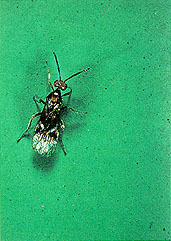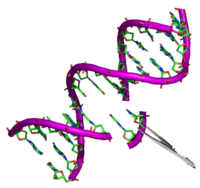
Dynamic changes of gut bacterial communities present in larvae of Anoplophora glabripennies collected at different developmental stages.
Sign Up to like & getrecommendations! Published in 2022 at "Archives of insect biochemistry and physiology"
DOI: 10.1002/arch.21978
Abstract: The Asian long-horned beetle, Anoplophora glabripennies (Motschulsky), is a destructive wood-boring pest that is capable of killing healthy trees. Gut bacteria in the larvae of the wood-boring pest is essential for the fitness of hosts. However,… read more here.
Keywords: instar; developmental stages; bacterial communities; instar larvae ... See more keywords

Identification of Hypoderma actaeon (Diptera: Oestridae) in red deer (Cervus elaphus) from northern Spain: Microscopy study and molecular analysis
Sign Up to like & getrecommendations! Published in 2022 at "Microscopy Research and Technique"
DOI: 10.1002/jemt.24247
Abstract: Hypoderma spp. larvae were observed subcutaneously in the dorsal and lumbar regions of red deer (Cervus elaphus) hunted in the province of León (northwestern Spain) causing a myiasis. They were removed and initially classified by… read more here.
Keywords: deer cervus; red deer; instar; actaeon ... See more keywords

Development of resistance in stored grain pest, Trogoderma granarium (Everts) against deltamethrin and its effective control by synergistic toxicity of bifenthrin and chlorpyrifos
Sign Up to like & getrecommendations! Published in 2020 at "Journal of Stored Products Research"
DOI: 10.1016/j.jspr.2020.101673
Abstract: Abstract The current investigation was conducted to estimate the resistance level against deltamethrin in fourth and sixth instar larvae of Trogoderma granarium collected from wheat storage warehouses of Dera Ghazi Khan (DGK), Okara (OKR) and… read more here.
Keywords: instar larvae; bifenthrin chlorpyrifos; resistance; instar ... See more keywords

A new direction to understand the life cycle of the Japanese pine sawyer considering the selection strategy of instar pathways
Sign Up to like & getrecommendations! Published in 2020 at "Scientific Reports"
DOI: 10.1038/s41598-020-73344-1
Abstract: The Japanese pine sawyer, Monochamus alternatus Hope (Coleoptera: Cerambycidae), transfers the pine wood nematode, Bursaphelenchus xylophilus (Steiner and Buhrer) that causes pine wilt disease (PWD), especially in Asian countries. The key for the control of… read more here.
Keywords: instar pathways; japanese pine; life cycle; instar ... See more keywords

Gamma radiation tolerance in different life stages of the fruit fly Drosophila melanogaster
Sign Up to like & getrecommendations! Published in 2017 at "International Journal of Radiation Biology"
DOI: 10.1080/09553002.2016.1266056
Abstract: Abstract Purpose: Insects are known to have higher levels of radiation tolerance than mammals. The fruit fly Drosophila provides opportunities for genetic analysis of radiation tolerance in insects. A knowledge of stage-specific sensitivity is required… read more here.
Keywords: radiation tolerance; instar; instar larvae;

The Developmental Characteristics for the Head Capsule Width of Monochamus alternatus (Coleoptera: Cerambycidae) Larvae and Determination of the Number of Instars
Sign Up to like & getrecommendations! Published in 2019 at "Journal of Insect Science"
DOI: 10.1093/jisesa/iez010
Abstract: Abstract The objective of this study was to determine the number of instars of Monochamus alternatus Hope (Coleoptera: Cerambycidae) larvae by comparing their head capsule widths (HCW) published in previous studies, as well as additional… read more here.
Keywords: instar larvae; larvae; monochamus alternatus; instar ... See more keywords

Sizing up spotted lanternfly nymphs for instar determination and growth allometry
Sign Up to like & getrecommendations! Published in 2022 at "PLOS ONE"
DOI: 10.1101/2022.03.07.483361
Abstract: A major ongoing research effort seeks to understand the behavior, ecology and control of the spotted lanternfly (SLF) (Lycorma delicatula), a highly invasive pest in the U.S. and South Korea. These insects undergo four nymphal… read more here.
Keywords: instar; body mass; stage; spotted lanternfly ... See more keywords

Isoform specific roles of Broad‐Complex in larval development in Leptinotarsa decemlineata
Sign Up to like & getrecommendations! Published in 2019 at "Insect Molecular Biology"
DOI: 10.1111/imb.12563
Abstract: Broad‐Complex (BrC) is a downstream target of both 20‐hydroxyecdysone and juvenile hormone signalling. BrC regulates morphogenetic changes between nymphal instars in hemimetabolans, whereas it controls pupal commitment, pupal morphogenesis and inhibits adult differentiation in holometabolans.… read more here.
Keywords: broad complex; rnai; brc; larvae ... See more keywords

Effects of phenological synchronization on caterpillar early-instar survival under a changing climate
Sign Up to like & getrecommendations! Published in 2018 at "Canadian Journal of Forest Research"
DOI: 10.1139/cjfr-2016-0537
Abstract: Early-instar caterpillars experience very high and often very variable mortality; if it is density dependent, it can be a key factor in outbreak dynamics. Plant physical and chemical defenses can be extremely effective against young… read more here.
Keywords: early instar; instar survival; mortality; instar ... See more keywords

Leaf Consumption and Preference to Conyza sp., Conventional and Bt Soybean by Helicoverpa armigera
Sign Up to like & getrecommendations! Published in 2019 at "Planta Daninha"
DOI: 10.1590/s0100-83582019370100123
Abstract: ABSTRACT: Helicoverpa armigera caterpillars are polyphagous and exhibit high migratory potential. Given the traits of this pest, alternative hosts located in or near the crop stand may support the survival and permanence of H. armigera… read more here.
Keywords: soybean; armigera; conventional soybean; conyza conventional ... See more keywords

Gut microbiota is a potential factor in shaping phenotypic variation in larvae and adults of female bumble bees
Sign Up to like & getrecommendations! Published in 2023 at "Frontiers in Microbiology"
DOI: 10.3389/fmicb.2023.1117077
Abstract: Host symbionts are often considered an essential part of the host phenotype, influencing host growth and development. Bumble bee is an ideal model for investigating the relationship between microbiota and phenotypes. Variations in life history… read more here.
Keywords: bumble bees; gut microbiota; instar; workers queens ... See more keywords